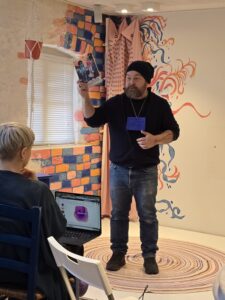Transformative Play Initiative member Kjell Hedgard Hugaas presented our Erasmus EDGE textbook in Oslo, Norway last week at the Nordic Larp Research Network 2025! In this brief talk, he shared basic information about the book, Transformative Role-playing Game Design, which is available as a free PDF and print-on-demand for a relatively charge here.
Big thanks to Hanne Grasmo for organizing the mini conference and helping us spread the word!

More information about the textbook:
Synopsis
This textbook describes theory and practice in analog role-playing game (RPG) design that encourage specific transformative impacts in participants, including tabletop, live action role-playing (larp), and Nordic and American freeform. We describe three types of transformative RPGs: transformative leisure, therapeutic, and educational. We present our model of nano-game design, offering recommendations for designing transformative goals; framing activities such as workshops and debriefs; narrative and culture design.
This interdisciplinary book highlights theories from role-playing game studies, peace and conflict studies, psychology, social psychology, sociology, counseling, anthropology, pedagogy, and several other fields. Key concepts include bleed, alibi, RPGs as transformational containers, immersion, identity, transfer, ritual, psychotherapeutic techniques, group theories, and educational theories. We emphasize psychological safety before, during, and after games, as well as strategies for cultivating transformational communities. Key topics include working with specific populations; crisis management; sensitive content and representation.
Then, we discuss working with myth, symbolism, and ritual, narrative, and postmodern magic as methods for transforming the stories of our lives. We cover forms of culture within and around RPGs, as well working with conflict in scenarios related to politics, culture, gender, sexuality, race, and ethnicity. We share thoughts around the use of RPGs to foster activism, advocacy, inclusion, and accessibility.
Finally, we offer considerations for researchers studying transformative role-playing games, including academic argument, structure, theory, method, data collection, ethics, and other considerations. We introduce key methods, including Research through Design, ethnography, and qualitative and quantitative data analysis. The book closes with a summary of evidence-based research available on the cognitive, affective, and behavioral effects of role-playing games.
Table of Contents:
“Preface”
Sarah Lynne Bowman, Elektra Diakolambrianou, Simon Brind
DOI: https://doi.org/10.33063/d5czz787
“Chapter 1: A Brief Introduction to Role-playing Games and Cousin Forms”
Sarah Lynne Bowman, Elektra Diakolambrianou, Angie Bandhoesingh, Alessandro Giovannucci, Guus Quinten van Tilborg, Taisto Suominen
DOI: https://doi.org/10.33063/4hrhm124
“Chapter 2: Transformative Role-playing Games: Types, Purposes, and Features”
Sarah Lynne Bowman, Elektra Diakolambrianou, Kjell Hedgard Hugaas, Josephine Baird, Josefin Westborg
DOI: https://doi.org/10.33063/r05n5t44
“Chapter 3: Theory, Central Concepts, and Inspirational Materials”
Sarah Lynne Bowman, Elektra Diakolambrianou, Simon Brind, Kjell Hedgard Hugaas, Josefin Westborg
DOI: https://doi.org/10.33063/xjq2gm46
“Chapter 4: Practice: Transformative Role-playing Game Design and Research”
Sarah Lynne Bowman, Simon Brind, Kjell Hedgard Hugaas, Alessandro Giovannucci, Josefin Westborg
DOI: https://doi.org/10.33063/yee0y133
“Chapter 5: Safety and Community Container Setting”
Sarah Lynne Bowman, Elektra Diakolambrianou, Angie Bandhoesingh, Kjell Hedgard Hugaas, Josephine Baird, Josefin Westborg
DOI: https://doi.org/10.33063/6tbcs669
“Chapter 6: Myth, Symbolism, Ritual, Magic, Narrative, Culture, and Conflict”
Sarah Lynne Bowman, Elektra Diakolambrianou, Simon Brind, Kjell Hedgard Hugaas, Alessandro Giovannucci, Guus Quinten van Tilborg, Josephine Baird
DOI: https://doi.org/10.33063/rvqvwj90
“Chapter 7: Research in Transformative Game Design”
Sarah Lynne Bowman, Elektra Diakolambrianou, Kjell Hedgard Hugaas, Josephine Baird, Taisto Suominen
DOI: https://doi.org/10.33063/f4yz1g62

